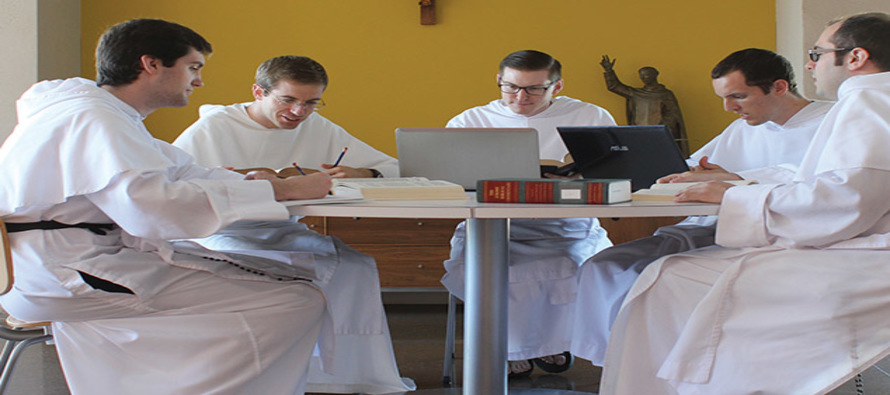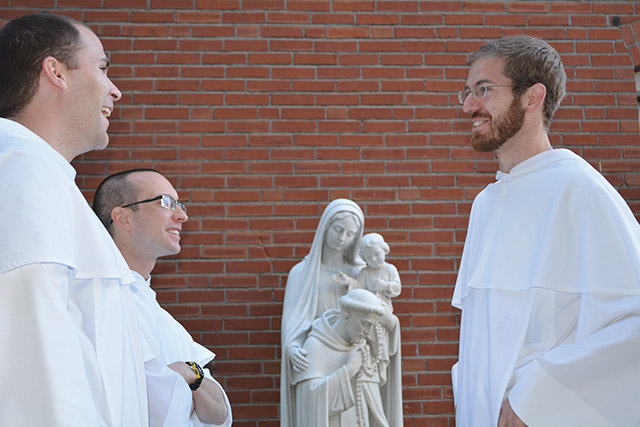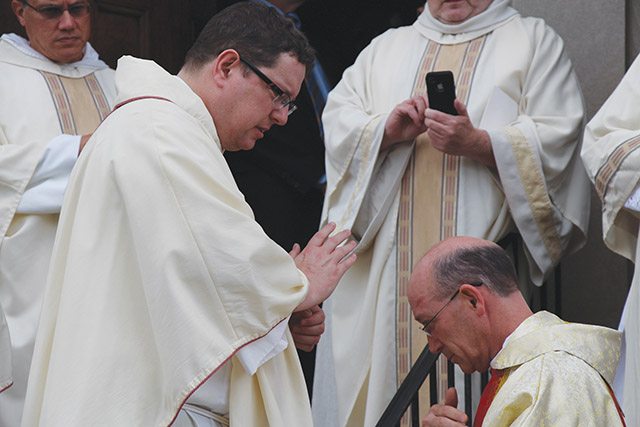Living the good life in community

Living in community is both rewarding and demanding. Each member of a religious community will need to compromise, adjust, forgive, and be forgiven, over and over. Pictured here are men who live in a Dominican studium, or house of studies, in St. Louis. (Photos courtesy of Dominican Central Province, opcentral.org.)
Community was the thing that attracted me most to religious life. Common life gives us the opportunity to live with a group of intensely committed Christians who will support, encourage, and love us, and expect the same in return as we serve others. Now that I’ve lived in community for a number of years, I thought I’d share with you just what that experience is like because it might help you make a decision about whether you are called to religious life.
Let’s start with a definition. What is a community? What does common life look like? I like this definition from my fellow Dominican Philip Neri Powell, O.P.: “A religious community is a group of women or men who have been called together by the Holy Spirit to give their lives to one another and pledge to live a religious life of freedom in obedience, poverty in simplicity, and chastity in celibate intimacy, as they serve the Lord.”
The biblical foundation of this definition comes from the Acts of the Apostles. Let’s look at the first few chapters to see what community life was like in first-century Jerusalem:
“They devoted themselves to the apostles’ teaching and fellowship, to the breaking of bread and the prayers . . . . All who believed were together and had all things in common; they would sell their possessions and goods and distribute the proceeds to all, as any had need” (Acts 2:42, 44-45).
Our Christian ancestors were very transparent to the Holy Spirit! To remain supple to the Spirit is a great blessing for common life. For centuries women and men religious have turned to Acts for our ideal of what it really means to live well in community.
We have learned through experience that there is a close connection between the quality of our life in common and the quality of our Christian witness to the world. When we are living community life well, it shows in the integrity of our personal and communal testimony to Jesus. When we are not living community life well, that shows too.
Despite the rosy picture painted in the section of Acts I just quoted, all was not milk and honey in Jerusalem’s good ol’ days. Consider Ananias and Sapphira. Most of the Jewish-Christians were “of one heart and soul.” They shared all their property and gave anything extra to the poor. Ananias and Sapphira sold a piece of property but turned in a fraction of the money. They lied to the apostles, to their community, and to the Holy Spirit about it. The two were not living community life well. They were holding back because they didn’t trust the community. The deception caused all of them horrible suffering.
You see, common life isn’t a given, it’s a goal—a Christian task to be accomplished in mutual pardon and in patience. The ideal of community holds us close in charity if and only if we keep focused, value diversity, and welcome gifts that differ. When things go wrong, we experience the Passion of Christ Jesus. When things go well, we experience the risen Jesus. Whatever we experience, we experience together in Christ. We are fragile vessels, but beyond our sufferings in community is the promise of Easter Sunday. Still, there are several skills that we practice to thrive as members of a religious community. I’d like to speak briefly about three.

Get over it!
During my early time with the community, the novitiate, I learned to love and respect my fellow novices and the professed friars (full-fledged members). In the novitiate I learned that being forged into a community happens in the give and take of daily life, in the kiln of human relationships.
A potter is always careful to maintain the proper balance of opposites in her work—wet and dry, hot and cold. If the harmony of all the elements is off by just the slightest amount, then it affects the quality of the entire work. It might turn out better than originally intended, or it might be destroyed. Some days in the novitiate I felt like a clay pot that had exploded into a thousand fragments by the extreme heat of the kiln!
There were eight of us in the novitiate. After the honeymoon of the first few weeks we had to come to grips with the fact that among us there were eight “right” ways to answer the phone, chant the psalms, mow the yard, or fry potatoes and onions. A few remedial courses during the pre-novitiate might have made things go smoother, because men don’t do community well if left to their own devices. We definitely needed to take, “Introduction to Common Household Objects: The Mop and Sponge.” I think a course called, “The Gas Gauge in the Car: Empty MEANS Empty,” might have helped, too. Novitiate wasn’t a walk in the park because we all had to change, to adjust, to become more like Jesus Christ, and less like ourselves.
When things got a little rough and I realized that I was being called to change for the good of the community’s life, the change wasn’t as hard. Living the ideal is really about the nuts and bolts of day-to-day living. God has all of us in an embrace so strong and mysterious that God will not turn away. How can we refuse the offer of relationship to one another in community? God asks for the passionate response of our whole selves. The skill of keeping our eyes focused on the ideal, especially during rough patches, helps us to thrive when the honeymoon’s over.
It’s not the gift, it’s the giving
It’s easy to get really worked up about “my life” when you live in a religious community if things aren’t going “my” way. When you first enter religious life, you may not realize that you are giving your self to the community, your whole being. This requires giving up a lot of control, but that doesn’t mean that you won’t be happy. You’ll compromise more than you ever thought possible, but as you allow yourself to become more and more identified with “us” instead of “me,” as your clay is sculpted into fine art, you’ll find that both you and the community will flourish like young green clover in a Blue Ridge Mountain springtime.
The gift you give is yourself. Give generously. Give often. If you start holding back, especially in the little things, you’ll never feel the real freedom of what common life is all about. You have to give, give, and give. The gift comes back pressed down and flowing over when all humbly welcome the gift that we can be to each other in common life. Giving and receiving, receiving and giving, again, again, and again, is at the very heart of common life.

Mistakes are made. You give too little or take too much. One day I missed morning prayer and Eucharist. I was extremely busy and had let some things go. I stayed awake all night writing a paper that was due the next day. Instead of gathering with the friars for morning prayer and Eucharist, I stayed in my room madly pounding out an assignment before the deadline.
Then I had to explain myself to the student master, not because he’s an authoritarian control freak, but because I had failed in my prior commitment to pray with the friars. I could have tried to let it slip. In a chapel of 40 men wearing the same white habit, there’s a good chance he wouldn’t have noticed my absence. “Besides,” my little voice said, “I am a grown man who can make prudent judgments about how I spend ‘my’ time.” This was definitely not a community way of thinking. So, I told him. And, he said, “Well, I hope you did a good job on the paper. Go to class and then get some rest. We’ll see you at evening prayer.”
Trusting the community and holding yourself personally accountable for the quality of common life draws us all closer together. It is our life, after all.
The house of mirrors
Community is a place where we can experience the sacrament of healing like no other. If you fail, your mistakes can be redeemed. If you’re wounded by life, your sisters and brothers can be there for you. These are extremely reassuring thoughts in an uncertain world.
Perhaps it sounds odd, but a good image of the reconciliation and healing that continually happens in any good community is the house of mirrors. A house of mirrors distorts our image of reality. “Are my ears really that big?”
Community can be like a house of mirrors if we are not loving and courageous. If we don’t tell a brother that his temper hurts our common life and is self-destructive, then we’re not living in community, we’re living at the county fair. Likewise, if we don’t thank a sister for her extravagant generosity, or congratulate her on something well done, then we’re not living in community, we’re living in a house of mirrors. Common life requires that we hold up an accurate mirror for a sister or brother, and that we have the courage to gaze unflinchingly into the mirrors that our sisters and brothers hold for us. This is the only way that we learn who we really are.
The skills I’ve suggested can be summed up in three short sentences: Look to the future. Persevere in the present. Tell the truth. They could also be called hope, faith, and love, the theological virtues that improve the way we relate to God, ourselves, and our sisters and brothers. They are absolutely indispensable in common life.
So, if you hope to enter a religious community and share in the joys, hopes, pains, and sorrows of vowed life, start practicing. You’ll find what you give in community comes back to you a thousand fold.
A version of this article originally appeared in VISION 2003.
Related article: VocationNetwork.org, “Community is the key.”
Tags
Related
- Questions you’ll be glad you asked
- What monastic mystics got right about life
- Religious communities embrace diverse members
- How my parents responded when I became a brother
- Vocation Basics: You are already called—Message to youth from Pope Francis
- Meet the parents
- Charism: The gift that shapes lives
- What our vows mean
- Discover five treasures of religious life
- Religious making a difference Read More
Most Viewed
- Find your spirituality type quiz
- Questions and answers about religious vocations
- Celibacy quiz: Could I be a nun? Could I be a brother? Could I be a priest?
- Resources for older discerners or those with physical and developmental differences
- About Vocation Network and VISION Guide


